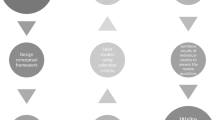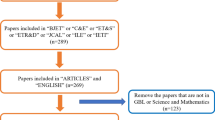Abstract
Digital Game-Based Assessment (DGBA) has emerged as a valid alternative to traditional assessment. This study conducted a systematic review of empirical studies on DGBA in the field of student evaluation from six aspects: country of research, education level of participant, game genre, content of assessment, method of assessment, and method of data analysis. It was found that DGBA has attracted extensive attention from researchers all over the world and it is applicable to students at almost all educational levels. The gener of game used for DGBA are mainly educational games. The main contents of assessment of DGBA are discipline knowledge, contemporary competence and cognitive ability. The main assessment methods of DGBA are formative assessment modeling with process data and summative assessment using final scores. Given these findings, this study made several recommendations for future studies on DGBA.
Access this chapter
Tax calculation will be finalised at checkout
Purchases are for personal use only
Similar content being viewed by others
References
Kiili, K., Devlin, K., Perttula, A., Tuomi, P., Lindstedt, A.: Using video games to combine learning and assessment in mathematics education. Int. J. Ser. Games. 2(4), 37–55 (2015). https://doi.org/10.17083/ijsg.v%vi%i.98
Shute, V.J.: Stealth assessment in computer-based games to support learning. Comput. Games Instr. 55(2), 503–524 (2011)
Shute, V.J., Rahimi, S.: Stealth assessment of creativity in a physics video game. Comput. Hum. Behav. 116, 106647 (2021). https://doi.org/10.1016/j.chb.2020.106647
Hawkes, B., Cek, I., Handler, C.: The gamification of employee selection tools: an exploration of viability, utility, and future directions (2018)
Auer, E.M., Mersy, G., Marin, S., Blaik, J., Landers, R.N.: Using machine learning to model trace behavioral data from a game‐based assessment. Int. J. Sel. Assess. 30, 1–21 (2021). https://doi.org/10.1111/ijsa.12363
Shute, V.J., Ventura, M., Kim, Y.J.: Assessment and learning of qualitative physics in Newton’s playground. J. Educ. Res. 106(6), 423–430 (2013). https://doi.org/10.1080/00220671.2013.832970
Hautala, J., Heikkilä, R., Nieminen, L., Rantanen, V., Latvala, J.M., Richardson, U.: Identification of reading difficulties by a digital game-based assessment technology. J. Educ. Comput. Res. 58(5), 1003–1028 (2020). https://doi.org/10.1177/0735633120905309
Kiili, K., Moeller, K., Ninaus, M.: Evaluating the effectiveness of a game-based rational number training-In-game metrics as learning indicators. Comput. Educ. 120, 13–28 (2018). https://doi.org/10.1016/j.compedu.2018.01.012
Shute, V.J., Wang, L., Greiff, S., Zhao, W., Moore, G.: Measuring problem solving skills via stealth assessment in an engaging video game. Comput. Hum. Behav. 63, 106–117 (2016). https://doi.org/10.1016/j.chb.2016.05.047
Song, Y., Sparks, J.R.: Building a game-enhanced formative assessment to gather evidence about middle school students’ argumentation skills. Educ. Tech. Res. Dev. 67(5), 1175–1196 (2019). https://doi.org/10.1007/s11423-018-9637-3
DeRosier, M.E., Thomas, J.M.: Establishing the criterion validity of ZooU's game-based social emotional skills assessment for school-based outcomes. J. Appl. Dev. Psychol. 55, 52–61 (2018). https://doi.org/10.1016/j.appdev.2017.03.001
Chuang, T.-Y., Zhi-Feng Liu, E., Shiu, W.-Y.: Game-based creativity assessment system: the application of fuzzy theory. Multimed. Tools App. 74(21), 9141–9155 (2014). https://doi.org/10.1007/s11042-014-2070-7
Acquah, E.O., Katz, H.T.: Digital game-based L2 learning outcomes for primary through high-school students: a systematic literature review. Comput. Educ. 143, 103667 (2020). https://doi.org/10.1016/j.compedu.2019.103667
Hung, H., Yang, J.C., Hwang, G., Chu, H., Wang, C.: A scoping review of research on digital game-based language learning. Comput. Educ. 126, 89–104 (2018). https://doi.org/10.1016/j.compedu.2018.07.001
Mislevy, R.J., Haertel, G.D.: Implications of evidence-centered design for educational testing. Educ. Meas. Issues Pract. 25(4), 6–20 (2006). https://doi.org/10.1111/j.1745-3992.2006.00075.x
Kiili, K., Ketamo, H.: Evaluating cognitive and affective outcomes of a digital game-based math test. IEEE Trans. Learn. Technol. 11(2), 255–263 (2017). https://doi.org/10.1109/TLT.2017.2687458
Chen, F., Cui, Y., Chu, M.-W.: Utilizing game analytics to inform and validate digital game-based assessment with evidence-centered game design: a case study. Int. J. Artif. Intell. Educ. 30(3), 481–503 (2020). https://doi.org/10.1007/s40593-020-00202-6
Irava, V., Pathak, A., DeRosier, M., Chatterjee Singh, N.: Game-based socio-emotional skills assessment: a comparison across three cultures. J. Educ. Technol. Syst. 48(1), 51–71 (2019). https://doi.org/10.1177/0047239519854042
Delgado-Gómez, D., et al.: Objective assessment of attention-deficit hyperactivity disorder (ADHD) using an infinite runner-based computer game: a pilot study. Brain Sci. 10(10), 716 (2020). https://doi.org/10.3390/brainsci10100716
Buford, C.C., O’Leary, B.J.: Assessment of fluid intelligence utilizing a computer simulated game. Int. J. Gaming Comput. Med. Simul. (IJGCMS) 7(4), 1–17 (2015). https://doi.org/10.4018/IJGCMS.2015100101
Krebs, E., Jaschek, C., Von Thienen, J., Borchart, K.P., Meinel, C., Kolodny, O.: Designing a video game to measure creativity. In: 2020 IEEE Conference on Games (CoG), pp. 407–414. IEEE (2020). https://doi.org/10.1109/CoG47356.2020.9231672
Slimani, A., Elouaai, F., Elaachak, L., Yedri, O.B., Bouhorma, M., Sbert, M.: Learning analytics through serious games: data mining algorithms for performance measurement and improvement purposes. Int. J. Emerg. Technol. Learn. (iJET) 13(1), 46–64 (2018). https://doi.org/10.3991/ijet.v13i01.7518
Peters, H., Kyngdon, A., Stillwell, D.: Construction and validation of a game-based intelligence assessment in minecraft. Comput. Hum. Behav. 119, 106701 (2021). https://doi.org/10.1016/j.chb.2021.106701
Halverson, R., Owen, V.E.: Game-based assessment: an integrated model for capturing evidence of learning in play. Int. J. Learn. Technol. 9(2), 111–138 (2014). https://doi.org/10.1504/IJLT.2014.064489
Zapata-Caceres, M., Martin, E., Roman-Gonzalez, M.: Collaborative game-based environment and assessment tool for learning computational thinking in primary school: a case study. IEEE Trans. Learn. Technol. (2021). https://doi.org/10.1109/TLT.2021.3111108
Quiroga, M.Á., et al.: Can we reliably measure the general factor of intelligence (g) through commercial video games? Yes, we can! Intelligence 53, 1–7 (2015). https://doi.org/10.1016/j.intell.2015.08.004
Nikoukaran, A., Moradi, H.: Assessment of children's working memory using a computer game. In: 2014 22nd Iranian Conference on Electrical Engineering (ICEE), pp. 1024–1029. IEEE (2014). https://doi.org/10.1109/IranianCEE.2014.6999686
Westera, W., Nadolski, R., Hummel, H.: Serious gaming analytics: what students̈ log files tell us about gaming and learning. Int. J. Ser. Games. 1(2), 35–50. (2014). https://doi.org/10.17083/ijsg.v1i2.9
Alonso-Fernández, C., Calvo-Morata, A., Freire, M., Martínez-Ortiz, I., Fernández-Manjón, B.: Evidence-based evaluation of a serious game to increase bullying awareness. Interact. Learn. Environ. 1–11 (2020). https://doi.org/10.1080/10494820.2020.1799031
Min, W., et al.: DeepStealth: leveraging deep learning models for stealth assessment in game-based learning environments. In: Conati, C., Heffernan, N., Mitrovic, A., Verdejo, MFelisa (eds.) Artificial Intelligence in Education. LNCS (LNAI), vol. 9112, pp. 277–286. Springer, Cham (2015). https://doi.org/10.1007/978-3-319-19773-9_28
Acknowledgments
The work was supported by a grant from the National Natural Science Foundation of China (No. 62107019).
Author information
Authors and Affiliations
Corresponding author
Editor information
Editors and Affiliations
Rights and permissions
Copyright information
© 2022 Springer Nature Switzerland AG
About this paper
Cite this paper
Zhu, S., Guo, Q., Yang, H.H. (2022). Digital Game-Based Assessment on Student Evaluation: A Systematic Review. In: Li, R.C., Cheung, S.K.S., Ng, P.H.F., Wong, LP., Wang, F.L. (eds) Blended Learning: Engaging Students in the New Normal Era. ICBL 2022. Lecture Notes in Computer Science, vol 13357. Springer, Cham. https://doi.org/10.1007/978-3-031-08939-8_8
Download citation
DOI: https://doi.org/10.1007/978-3-031-08939-8_8
Published:
Publisher Name: Springer, Cham
Print ISBN: 978-3-031-08938-1
Online ISBN: 978-3-031-08939-8
eBook Packages: Computer ScienceComputer Science (R0)




